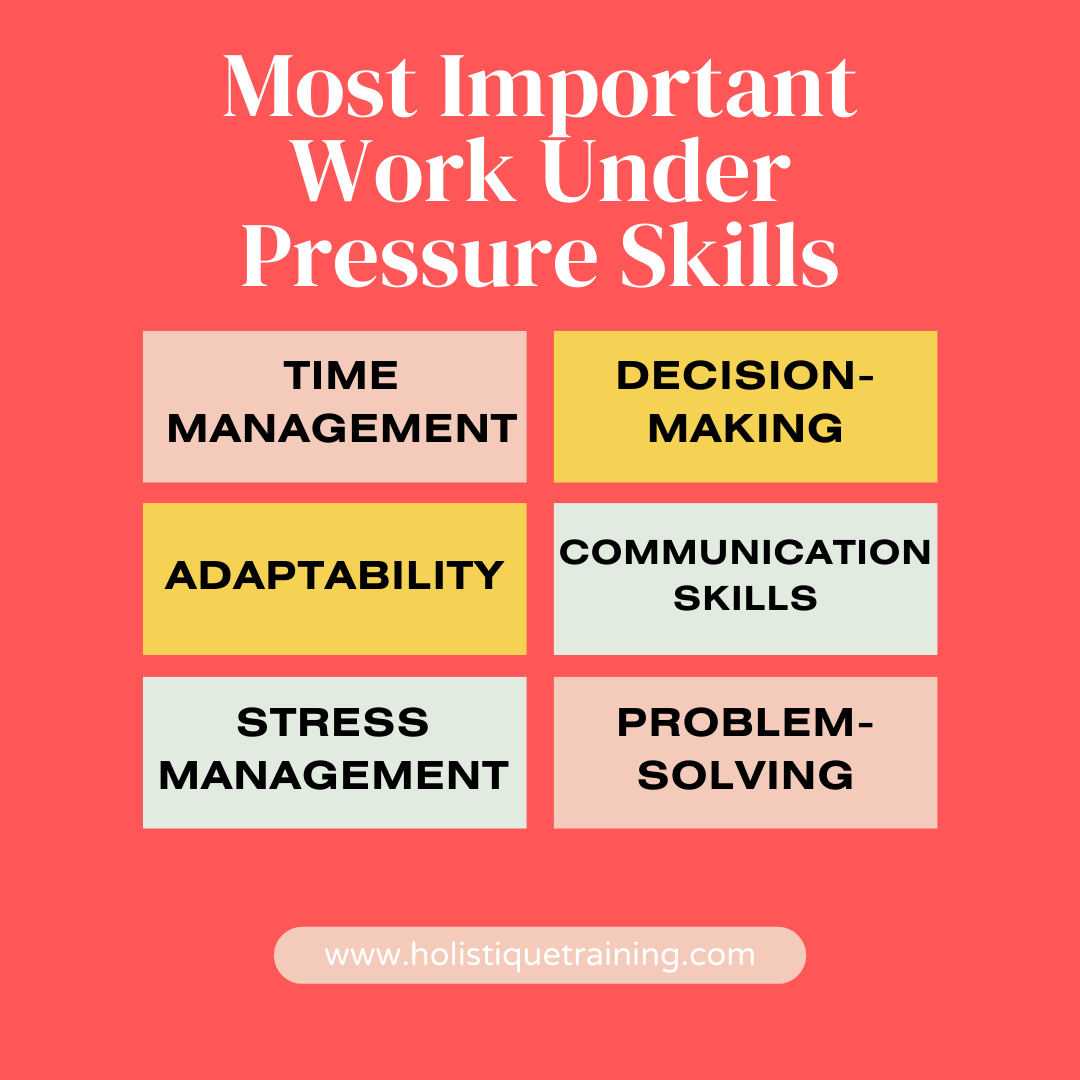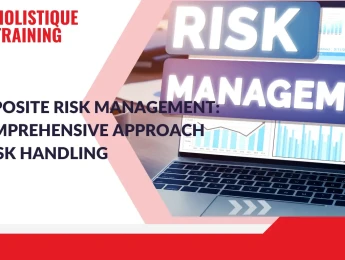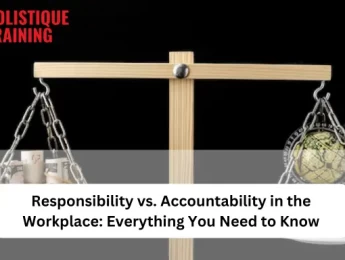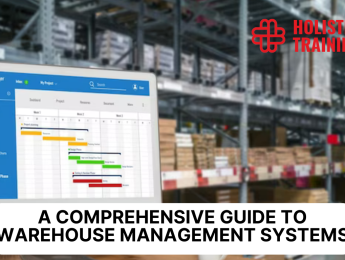- Table of Contents
- Introduction
- What Does Working Under Pressure Mean?
- Why Do Employers Value the Ability to Work Under Pressure?
- The Pulse of the Professional World
- Catalyst for Innovation
- Consistent Performance in the Face of Uncertainty
- Client and Stakeholder Confidence
- Adaptability in a Shifting Landscape
- Efficiency in Crisis Management
- What Skills Do You Need to Work Under Pressure?
- 1. Time Management
- 2. Decision-Making
- 3. Adaptability
- 4. Communication
- 5. Problem-Solving
- 6. Stress Management
- 7. Teamwork
- 8. Attention to Detail
- 9. Leadership
- 10. Self-Motivation
- Jobs That Demand Work Under Pressure Skills
- 1. Emergency Services
- 2. Healthcare Professionals
- 3. Project Management
- 4. Journalism
- 5. Air Traffic Controllers
- 6. Sales and Marketing
- 7. Military Operations
- 8. Event Management
- 9. Legal Professions
- 10. Aviation Pilots
- How to Say You Work Under Pressure in a Resume (Without Saying It)
- 1- Resume Objective
- 2- Skills Section
- 3- Work Experience
- 4- Achievements
- 5- Education Section
- 6- Certifications
- 7- Volunteer Experience
- 8- Professional Memberships
- 9- Cover Letter
- Tips to Manage Working Under Pressure
- 1. Prioritise Tasks
- 2. Break it Down
- 3. Maintain a Positive Mindset
- 4. Seek Support
- 5. Learn from Experience
- 6. Time Management Techniques
- 7. Continuous Learning
- 8. Physical Well-being
- 9. Maintain Perspective
- 10. Develop a Toolkit of Coping Mechanisms
- 11. Embrace Change as an Opportunity
- 12. Communicate Effectively
- Conclusion
Introduction
Thriving in the professional arena often requires more than just technical expertise. One crucial skill that can set you apart is the ability to work under pressure. It's not merely a catchphrase but a trait employers highly value. In this blog post, we'll delve into what working under pressure truly means, why employers consider it a prized quality, the essential skills required, job domains where it's paramount, subtle ways to convey it on your resume, and some invaluable tips to navigate the demanding landscape.
What Does Working Under Pressure Mean?
Working under pressure is more than just meeting tight deadlines or handling challenging situations. It's a dynamic skill that encompasses staying calm, focused, and effective in the face of adversity. Whether it's a looming project deadline, a crisis in the boardroom, or a sudden shift in priorities, those who excel under pressure display resilience and adaptability.
Why Do Employers Value the Ability to Work Under Pressure?
The Pulse of the Professional World
In the dynamic professional realm, change is the only constant. Employers recognise that individuals who navigate and excel amid uncertainty are invaluable assets to their organisations. The ability to work under pressure is a litmus test for an individual's adaptability and composure in high-stakes scenarios, making it a trait that resonates with the pulse of the professional world.
Catalyst for Innovation
It's often said that necessity is the mother of invention, and pressure is the catalyst that propels innovation. Employers value individuals who don't merely survive under pressure but thrive in it, as these individuals are more likely to find creative solutions to problems. The necessity to think on one's feet, adapt strategies swiftly, and envision unconventional approaches is heightened in high-pressure situations. This innovative mindset isn't just an asset; it's a driving force behind breakthroughs and improvements in processes, contributing significantly to the overall growth and development of the organisation.
Consistent Performance in the Face of Uncertainty
In an era of unpredictability, employers seek individuals who can maintain consistent performance levels regardless of external pressures. The ability to deliver quality work under stressful conditions ensures that the wheels of progress keep turning, even when faced with unexpected challenges. This resilience in the face of uncertainty is a testament to an employee's dedication and reliability, qualities that employers cherish as they contribute directly to the organisation's stability and success.
Client and Stakeholder Confidence
From a client and stakeholder perspective, confidence in a business or service provider is paramount. Clients want to know that their projects will be handled with diligence and expertise, even when unforeseen challenges arise. Employers value the ability to work under pressure because it directly translates to the assurance that commitments will be met, deadlines adhered to, and challenges overcome without compromising the quality of deliverables. This instil confidence in clients and stakeholders, fostering long-term relationships and positive reputations.
Adaptability in a Shifting Landscape
The business landscape is marked by constant change—technological advancements, market shifts, and global events can reshape industries overnight. Employers recognise that individuals who can work under pressure possess a unique skill set that aligns seamlessly with the demands of a shifting landscape. Whether adapting to new technologies, navigating changes in market dynamics, or responding to unexpected crises, those adept at working under pressure become linchpins in an organisation's ability to survive and thrive amidst change.
Efficiency in Crisis Management
In times of crisis, an organisation's ability to navigate challenges efficiently can be the difference between success and failure. Employers value individuals who can keep a level head, make informed decisions, and execute plans precisely during critical moments. The capacity to manage crises effectively is a testament to an employee's strategic thinking, leadership potential, and overall contribution to the organisation's resilience in the face of adversity.
In essence, the ability to work under pressure is not merely a skill; it's a multifaceted quality that speaks to an individual's adaptability, innovation, consistency, client and stakeholder confidence, adaptability, and efficiency in crisis management. Employers recognise that those who possess this ability are not just assets in demanding situations but linchpins for organisational success in the ever-evolving landscape of the professional world.
What Skills Do You Need to Work Under Pressure?
1. Time Management
Time management is the cornerstone of working effectively under pressure. The ability to prioritise tasks, allocate time wisely, and maintain a sense of urgency ensures that deadlines are met without compromising the quality of work. Successful time management prevents a backlog of responsibilities, enabling individuals to navigate high-pressure situations seamlessly.
2. Decision-Making
Quick, informed decision-making is a pivotal skill under pressure. Individuals who excel in high-stakes situations can analyse information swiftly, assess available options, and make decisions that align with the project's or task's overarching goals. Sound decision-making is crucial for maintaining momentum and achieving objectives under tight timelines.
3. Adaptability
Flexibility and adaptability are essential traits for those working under pressure. The capacity to adjust strategies and approaches swiftly in response to changing circumstances is paramount. Whether it's a sudden shift in project priorities or an unexpected challenge, individuals who can adapt seamlessly demonstrate resilience and maintain effectiveness in dynamic environments.
4. Communication
Clear and effective communication becomes even more critical in high-pressure environments. The ability to convey information concisely, articulate ideas, and collaborate with team members ensures everyone is on the same page. Effective communication minimises the risk of misunderstandings, streamlines processes, and fosters a collaborative environment even in the midst of pressure.
5. Problem-Solving
High-pressure situations often come with unforeseen challenges. The ability to solve problems efficiently and methodically is a key skill. Individuals who excel under pressure can analyse complex issues, identify viable solutions, and implement them effectively. Strong problem-solving skills contribute to maintaining progress and preventing setbacks.
6. Stress Management
Stress is an inevitable companion in high-pressure scenarios. Statistics show that 80% of workers in America experience job-related stress. This makes stress management a crucial skill. Techniques such as mindfulness, deep breathing exercises, and maintaining a healthy work-life balance are essential. Individuals who can effectively manage stress remain focused, make better decisions, and navigate pressure-cooker situations with composure. Understanding your Enneagram type can also provide valuable insight into how you respond to stress and which coping strategies work best for your personality.
7. Teamwork
Collaboration is a linchpin skill when working under pressure. The ability to function as part of a team, delegate tasks efficiently, and leverage collective strengths ensures that the workload is distributed effectively. A team player mentality contributes to a cohesive work environment, promoting mutual support and shared responsibility.

8. Attention to Detail
Attention to detail should not be sacrificed even in high-pressure scenarios. Precision in work and an eye for detail ensure that output quality remains consistently high. Individuals who maintain attention to detail under pressure minimise the risk of errors and contribute to the project's overall success.
9. Leadership
Certain high-pressure situations may demand leadership skills. The ability to guide a team, make decisions with authority, and inspire confidence in others is valuable. Individuals who can step into leadership roles under pressure contribute to resolving immediate challenges and the overall success of the team and the organisation.
10. Self-Motivation
Working under pressure requires a high degree of self-motivation. The ability to stay focused on tasks, maintain a positive mindset, and exhibit determination, even when faced with adversity, ensures consistent performance. Self-motivated individuals become driving forces in high-pressure situations, inspiring others and contributing to the team's overall success.
In summary, the top skills required to work under pressure form a dynamic set that combines time management, decision-making, adaptability, communication, problem-solving, stress management, teamwork, attention to detail, leadership, and self-motivation. The interplay of these skills empowers individuals to navigate pressure and thrive and contribute meaningfully in challenging professional environments.
Jobs That Demand Work Under Pressure Skills
While the need for skills in working under pressure is ubiquitous, certain professions demand these skills more explicitly. Here are some jobs where the ability to handle pressure is not just an asset but a prerequisite:
1. Emergency Services
Emergency services occupations, such as paramedics, firefighters, and police officers, epitomise high-pressure environments. These professionals often make split-second decisions in life-or-death situations. The ability to stay calm under extreme pressure, make quick and accurate decisions, and execute plans precisely is paramount for success in these critical roles.
2. Healthcare Professionals
Doctors, nurses, and other healthcare professionals operate in fast-paced and high-stakes environments. From emergency rooms to surgical theatres, healthcare workers must navigate unpredictable situations, often handling multiple critical cases simultaneously. The capacity to work under pressure is not just an asset but a fundamental requirement for delivering quality patient care amid challenging circumstances.
3. Project Management
Project managers are often at the forefront of managing complex tasks, tight deadlines, and unforeseen challenges. The nature of project management requires individuals to coordinate diverse teams, make strategic decisions, and ensure that projects are delivered on time and within budget. Working under pressure is a daily reality for project managers, making it an integral skill for success in this field.
4. Journalism
The world of journalism is fast-paced, unpredictable, and often involves responding to unfolding events. Journalists need to meet tight deadlines, report accurately, and adapt swiftly to changing situations. The ability to work under pressure ensures that journalists can deliver timely and accurate news coverage, even in the midst of rapidly evolving events.
5. Air Traffic Controllers
Air traffic controllers are critical in ensuring aircraft's safe and efficient movement. In high-traffic situations or during emergencies, these professionals must make quick decisions, communicate effectively with pilots, and coordinate air traffic precisely. Working under pressure is beneficial and a fundamental requirement for this safety-critical role.
6. Sales and Marketing
Professionals in sales and marketing often operate in competitive environments with demanding targets and timelines. Meeting sales quotas, launching successful marketing campaigns, and adapting strategies to dynamic market conditions require individuals to work effectively under pressure. The capacity to stay composed and deliver results in high-pressure sales environments is a distinguishing factor for success in these roles.
7. Military Operations
Military personnel operate in environments where split-second decisions and effective responses to crises can be a matter of life or death. Whether in combat situations or strategic planning, individuals in the military must possess a high level of resilience, adaptability, and the ability to work under intense pressure to ensure mission success.
8. Event Management
Event managers are responsible for coordinating and executing events ranging from conferences to festivals. The dynamic nature of events, coupled with the need for flawless execution, demands individuals who can work under pressure. Event managers must navigate unexpected challenges, coordinate with multiple stakeholders, and ensure that events unfold seamlessly.
9. Legal Professions
Lawyers, especially those involved in litigation, often operate under tight deadlines and face intense courtroom situations. The ability to make persuasive arguments, respond to unforeseen developments, and manage stress in high-pressure legal scenarios is crucial for success in the legal profession.
10. Aviation Pilots
Pilots navigate complex and dynamic situations, especially during takeoff, landing, and adverse weather conditions. The ability to make split-second decisions, communicate effectively with the control tower, and navigate the aircraft safely under pressure is a fundamental skill for pilots.
In these professions, the demand for skills for working under pressure is not just a feature of the job; it's an inherent and defining aspect. Individuals who thrive in these environments have the technical expertise, resilience, adaptability, and composure required to excel in the face of high-stakes challenges. The ability to work under pressure becomes not just a skill but a critical determinant of success in these diverse and demanding fields.
How to Say You Work Under Pressure in a Resume (Without Saying It)
In the competitive job application landscape, subtly showcasing your ability to work under pressure is an art that can set you apart from the crowd. Instead of explicitly stating the phrase, consider strategically incorporating this skill throughout different sections of your resume to create a nuanced narrative of your capacity to thrive in challenging environments.
1- Resume Objective
Craft a compelling opening statement that hints at your prowess in handling pressure without explicitly mentioning it.
"Dedicated professional with a proven track record of excelling in dynamic environments, adept at navigating challenges with poise and precision. Passionate about delivering optimal results under tight deadlines and contributing to high-performance teams."
2- Skills Section
Integrate specific skills that reflect your ability to handle pressure without overtly stating it.
Time Management: Demonstrated ability to meet tight deadlines and prioritise tasks efficiently.
Decision-Making: Proven track record of making sound decisions in fast-paced environments.
Adaptability: Thrives in dynamic situations, adept at adjusting strategies to meet evolving needs.
3- Work Experience
Showcase achievements and responsibilities that underscore your ability to handle pressure.
"Led a cross-functional team to successfully deliver a critical project ahead of schedule, demonstrating resilience and adaptability in a high-pressure environment."
4- Achievements
Quantify your accomplishments to emphasise your ability to perform under pressure.
"Achieved a 20% increase in sales during a challenging market period, showcasing the ability to excel in high-pressure sales environments."
5- Education Section
If applicable, highlight any academic experiences demonstrating your ability to handle pressure.
"Completed a demanding capstone project that required swift decision-making and adaptability, resulting in recognition for outstanding performance."
6- Certifications
Mention any relevant certifications that indirectly convey your capacity to work under pressure.
"Certified Project Management Professional (PMP), equipped with the skills to manage projects in fast-paced and dynamic environments effectively."
7- Volunteer Experience
Incorporate volunteer experiences that mirror the challenges of a high-pressure work environment.
"Volunteered in crisis response teams, showcasing the ability to remain calm and effective in rapidly changing and challenging situations."
8- Professional Memberships
Highlight memberships in professional organisations that emphasise your commitment to high-performance standards.
"Member of the National Association of Professionals, dedicated to upholding excellence in fast-paced and demanding professional environments."
9- Cover Letter
Use your cover letter to provide a narrative reinforcing your ability to work under pressure.
"In my previous roles, I've thrived in fast-paced environments, successfully managing multiple tasks precisely. My ability to adapt swiftly to changing circumstances and consistently deliver results, even under tight deadlines, positions me as an ideal candidate for this role."
By weaving these subtle cues throughout different sections of your resume, you create a narrative that speaks to your ability to handle pressure without explicitly stating it. This approach allows potential employers to infer your resilience, adaptability, and composure in high-stakes situations, creating a more nuanced and compelling representation of your professional capabilities.
Situation | Demonstrated Skill | Outcome |
Tight project deadline | Effective time management. | Successfully delivered the project ahead of schedule. |
Emergency room situation | Quick decision-making. | Provided immediate and accurate patient care. |
Market volatility in sales | Adaptability to dynamic conditions. | Exceeded sales quotas despite a challenging market. |
Crisis in a legal case | Problem-solving under pressure. | Formulated strategic legal solutions swiftly. |
Air traffic during adverse weather | Communication and coordination. | Safely navigated aircraft during challenging weather. |
Table 1: Examples of working under pressure skills
Tips to Manage Working Under Pressure
Navigating high-pressure situations is an art that goes beyond skill; it requires a strategic approach and a well-honed mindset. Whether you're a seasoned professional or just starting your career, these tips will empower you to survive and thrive under pressure.
1. Prioritise Tasks
In the heat of the moment, it's easy to feel overwhelmed by many tasks. Prioritise your responsibilities by identifying the most critical ones. This ensures that you address urgent matters promptly and prevent the accumulation of stress-inducing work.
2. Break it Down
Large, complex tasks can be daunting, especially under pressure. Break them down into smaller, more manageable components. This approach allows you to focus on one aspect at a time, making the workload seem less overwhelming and enabling a more systematic approach.
3. Maintain a Positive Mindset
Cultivate a positive attitude even when faced with challenges. A positive mindset can significantly impact your problem-solving abilities, enhance creativity, and contribute to a more constructive work environment. Focus on solutions rather than dwelling on the pressure.
4. Seek Support
You don't have to navigate pressure alone. Lean on your team or seek guidance from colleagues. Collaborative efforts can alleviate the burden, provide fresh perspectives, and lead to more effective problem-solving. The camaraderie and shared responsibility also foster a sense of unity.
5. Learn from Experience
Reflect on past experiences of working under pressure. Identify what strategies worked well and learn from challenges to improve your approach in future situations. Each high-pressure scenario is an opportunity for growth and refinement of your coping mechanisms.
6. Time Management Techniques
Explore time management techniques that align with your workflow. Methods such as the Pomodoro Technique or the Eisenhower Matrix can enhance your efficiency and productivity under tight deadlines. Effective time management is a key factor in successfully navigating pressure.
7. Continuous Learning
Stay informed about industry trends, new technologies, and best practices. Continuous learning enhances your knowledge base and equips you with the skills needed to adapt to evolving situations. Proactively seeking knowledge positions you as a proactive problem solver.
8. Physical Well-being
Prioritise your physical well-being, especially during high-pressure periods. Regular exercise, a balanced diet, and sufficient sleep increase resilience and stress management. A healthy body supports a healthy mind, enhancing your ability to navigate pressure-cooker situations.
9. Maintain Perspective
Keep the bigger picture in mind. In the midst of pressure, losing sight of the overall goal is easy. Remember the broader purpose, and consider how the current challenges contribute to long-term success. Maintaining perspective can help alleviate stress and keep you focused.
10. Develop a Toolkit of Coping Mechanisms
Identify coping mechanisms that work for you. Whether it's deep breathing exercises, mindfulness practices, or brief breaks to clear your mind, having a toolkit of coping mechanisms can help you stay composed and centred in the midst of pressure.
11. Embrace Change as an Opportunity
View pressure as an opportunity for growth rather than an obstacle. Embrace change as a chance to learn, adapt, and showcase your ability to excel in dynamic environments. A positive attitude towards change can turn pressure into a personal and professional development catalyst.
12. Communicate Effectively
Keep communication channels open and transparent. Clearly express your needs, share updates with your team, and proactively seek assistance when necessary. Effective communication fosters collaboration and ensures everyone is on the same page during high-pressure situations.
In short, mastering the art of working under pressure involves a combination of strategic approaches and a resilient mindset. By implementing these tips, you can navigate high-pressure scenarios more effectively and transform them into personal and professional growth opportunities. Remember, the ability to work under pressure is not just a skill—it's a mindset that, when cultivated, can elevate your performance and contribute to your success in any professional endeavour.
Conclusion
The ability to work under pressure is not just a skill; it's a dynamic quality that can propel your professional journey to new heights. By understanding its nuances, honing the necessary skills, and strategically showcasing them, you position yourself as a valuable asset in any high-stakes environment. Embrace the challenges, learn from the pressure-cooker moments, and let your ability to thrive in adversity become the cornerstone of your success.
The journey to mastering the art of working under pressure is an ongoing pursuit of excellence. Elevate your professional prowess to unprecedented levels by enrolling in our transformative course, ‘Perfecting Your Management and Leadership Skills.’ Learn advanced strategies, gain hands-on insights, and unlock your full potential as a leader in high-pressure environments. Your path to success begins with refining these essential skills—enrol today and steer your career toward unparalleled achievements.
























